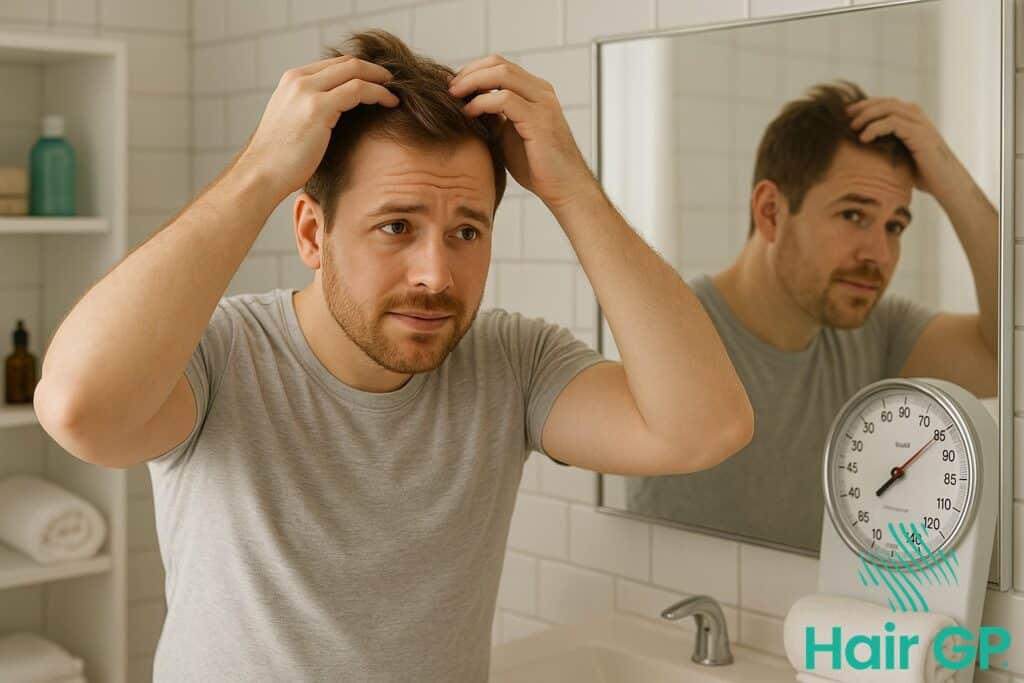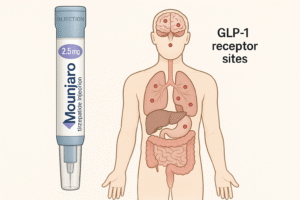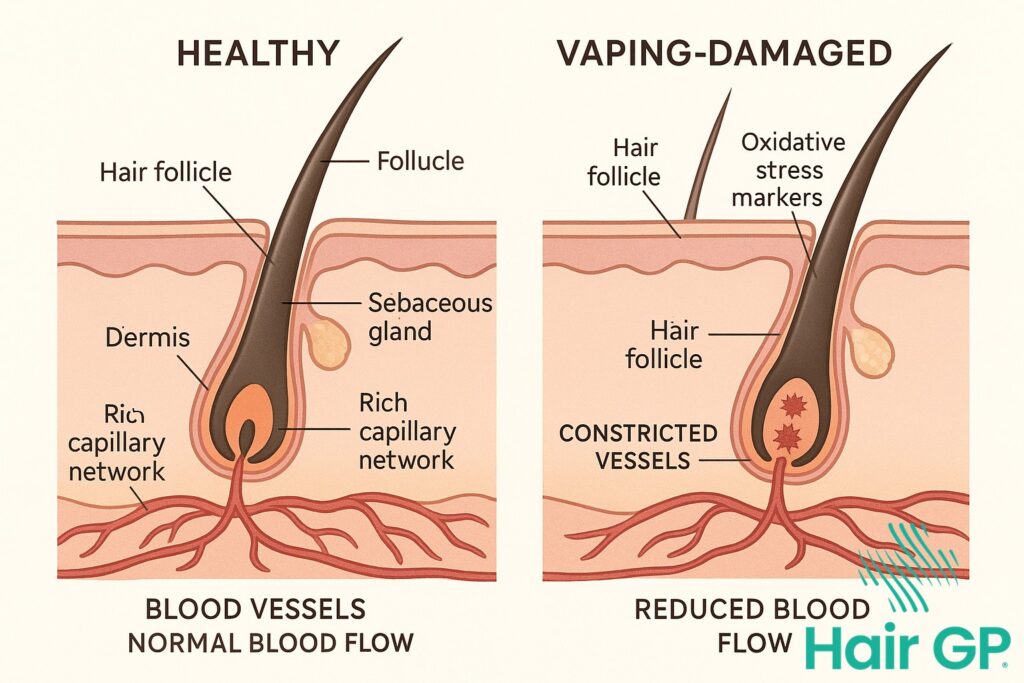Introduction
The pursuit of quick weight loss has taken a surprising turn for many individuals who find themselves experiencing hair loss alongside their shrinking waistlines. Whether through crash dieting or the use of weight loss medications like Ozempic, rapid weight loss can trigger an unexpected side effect that leaves many feeling distressed and confused. This phenomenon has become increasingly common as more people turn to aggressive weight loss methods and new pharmaceutical options to achieve their body goals.
The connection between sudden weight changes and hair health is more complex than many realise. When the body undergoes rapid weight loss, it can disrupt normal biological processes, including the hair growth cycle. This disruption often leads to a condition where hair follicles prematurely enter a resting phase, resulting in noticeable thinning and shedding weeks or months after beginning a weight loss journey.
This comprehensive guide will explore the science behind why crash dieting and medications trigger this response, with particular focus on the increasingly reported Ozempic hair loss experiences. We’ll examine how different weight loss approaches affect hair health, from traditional restrictive diets to newer pharmaceutical interventions. Additionally, you’ll discover practical strategies for preventing hair loss whilst pursuing weight goals, effective treatment options if you’re already experiencing hair loss, and realistic timelines for recovery. Understanding these connections empowers you to make informed decisions about your weight loss journey whilst protecting your hair health.
Key Takeaways – TL/DR
- Rapid weight loss from crash dieting or medications like Ozempic can trigger telogen effluvium, causing temporary hair loss
- Hair loss typically begins 2-3 months after starting weight loss treatment and affects up to 25% of users
- Most hair loss from weight loss is temporary and reversible with proper nutrition and care
- Maintaining adequate protein intake and key nutrients can minimize hair loss during weight loss
- Recovery typically takes 3-6 months after addressing nutritional deficiencies
Understanding the Link Between Rapid Weight Loss and Hair Loss
Rapid weight loss disrupts the delicate balance of the hair growth cycle, often resulting in significant hair shedding weeks or months after the initial weight change. This biological response occurs when the body perceives sudden weight loss as a form of stress, redirecting nutrients away from non-essential functions like hair growth to support vital organs.
What Is Telogen Effluvium?
Telogen effluvium represents a common form of temporary hair loss characterised by excessive shedding due to a disruption in the normal hair growth cycle[1]. Unlike pattern baldness or permanent hair loss conditions, telogen effluvium occurs when a significant number of hair follicles prematurely enter the telogen phase—the resting stage of hair growth. During this condition, approximately 30% of hair follicles may shift into the telogen phase, compared to the normal 5-10%[1].
Typical triggers for telogen effluvium include physical or emotional stress, hormonal changes, and notably, sudden weight loss exceeding 20 pounds. The condition typically manifests two to three months after the triggering event[2], leaving many people puzzled about the delayed connection between their diet and hair health.
Why Crash Dieting Triggers Hair Loss
Crash dieting creates a perfect storm for hair shedding through multiple mechanisms. Severe calorie restriction deprives hair follicles of essential proteins, as the body prioritises vital organs over hair production. This protein deficiency directly impacts keratin production, the primary structural component of hair.
Additionally, rapid weight loss depletes crucial vitamins and minerals including iron, zinc, and B vitamins—all essential for maintaining healthy hair growth. The metabolic stress from extreme dieting also triggers hormonal fluctuations, particularly affecting thyroid hormones and cortisol levels, further disrupting the hair growth cycle and pushing more follicles into premature rest.
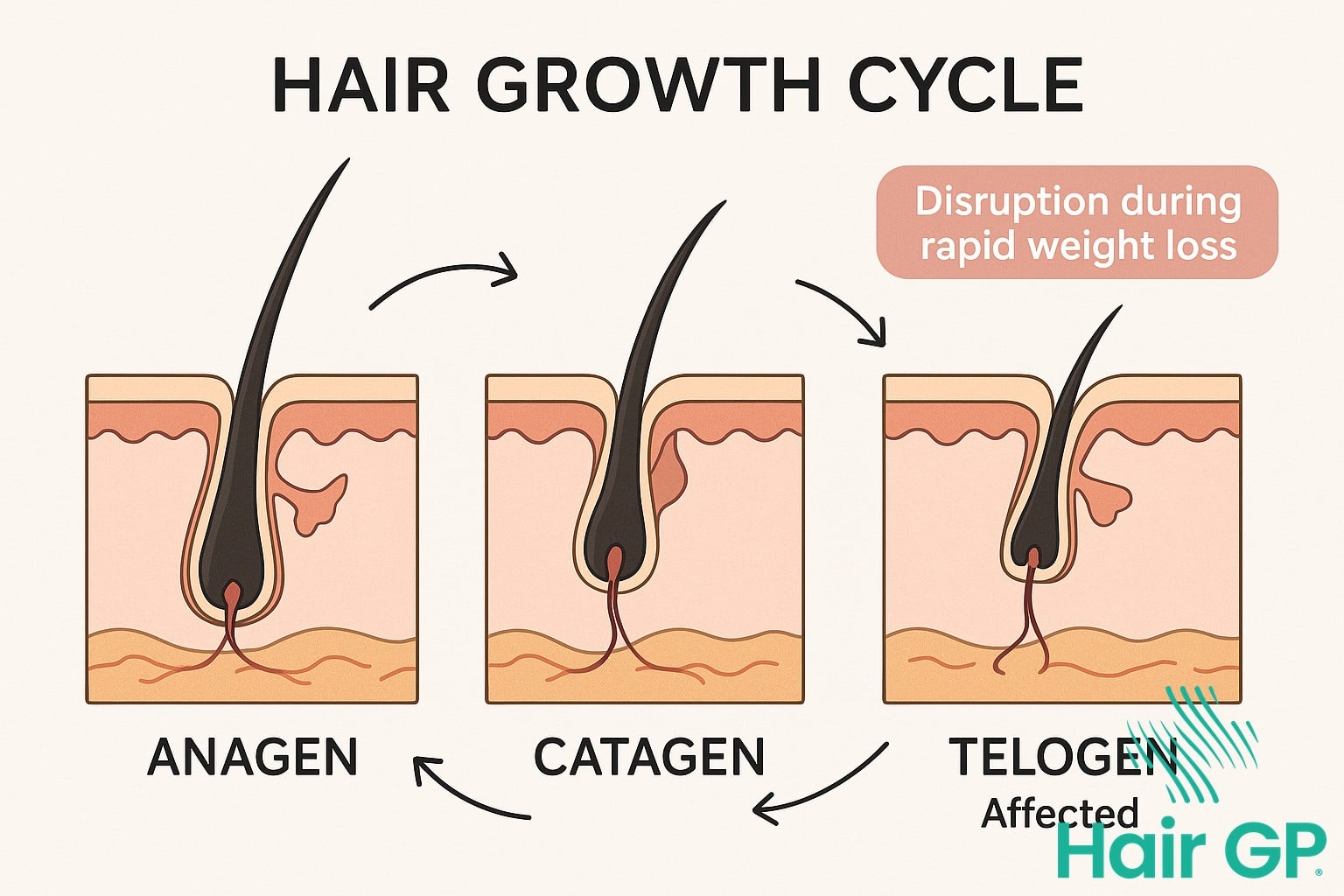
The Ozempic Hair Loss Phenomenon
The emergence of Ozempic hair loss has become a notable concern among users of this popular weight loss drug, with many reporting unexpected hair thinning whilst experiencing dramatic weight reduction. This GLP-1 receptor agonist medication, whilst highly effective for weight management, can indirectly trigger temporary hair loss through its powerful effects on appetite suppression and the resulting rapid weight changes that stress the body’s systems.
How Ozempic Works
Ozempic (semaglutide) functions as a GLP-1 receptor agonist, mimicking the naturally occurring incretin hormone that regulates blood sugar and appetite. When taking Ozempic, the medication binds to GLP-1 receptors throughout the body, triggering a cascade of metabolic effects. The primary mechanism involves slowing gastric emptying and enhancing satiety signals to the brain, leading to significant appetite suppression [3].
This powerful appetite control typically results in rapid weight loss, with clinical trials showing average reductions of 12-15% of body weight over 68 weeks. The dramatic caloric restriction that often accompanies Ozempic treatment creates the metabolic conditions that can subsequently affect hair growth cycles, as the body prioritises essential functions over hair production during periods of significant nutritional stress.
Why Ozempic Users Experience Hair Loss
The primary culprit behind noticeable hair loss in Ozempic users isn’t the medication itself, but rather the rapid weight loss it facilitates. When the body experiences sudden caloric restriction and weight reduction, it can trigger telogen effluvium, a form of temporary hair loss where hair follicles prematurely enter the resting phase [4]. This typically manifests two to three months after beginning treatment, coinciding with the period of most dramatic weight change.
Additionally, the appetite suppression effects of Ozempic can lead to inadequate protein and micronutrient intake, particularly iron, zinc, and B vitamins essential for healthy hair growth. The reduced nutrient absorption, combined with the metabolic stress of rapid weight loss, creates a perfect storm for hair follicle disruption. Fortunately, this hair loss is typically reversible once weight stabilises and nutritional status improves.
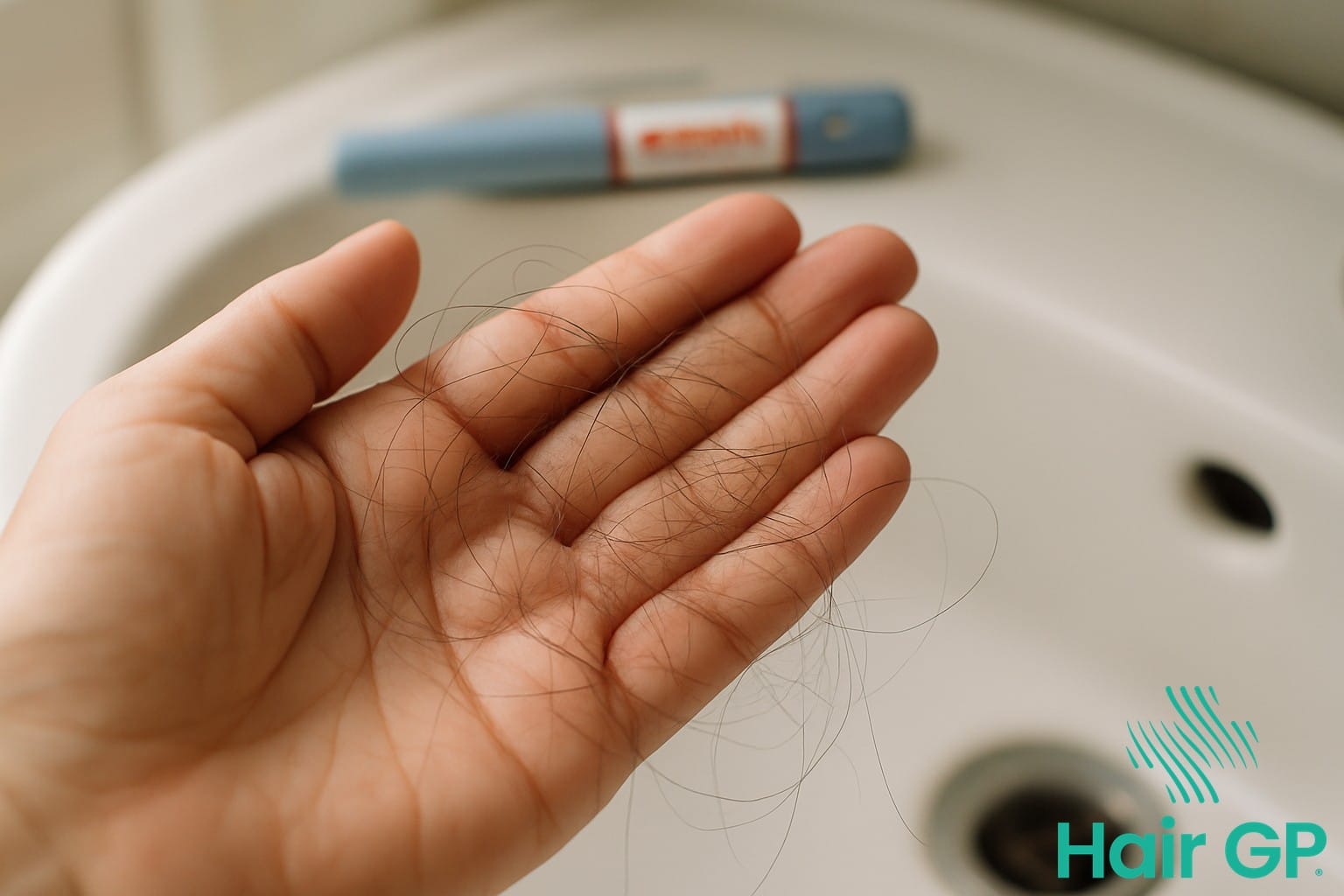
Other Weight Loss Medications and Hair Loss Risk
Hair loss associated with weight loss medication extends beyond Ozempic to encompass a broad spectrum of pharmaceutical interventions for obesity. Wegovy, which contains the same active ingredient as Ozempic (semaglutide) but at higher doses, demonstrates similar patterns of telogen effluvium in patients experiencing rapid weight reduction [5]. The incidence of hair loss caused by these GLP-1 receptor agonists typically correlates with the velocity and magnitude of weight change rather than the specific medication itself.
Mounjaro (tirzepatide), a newer dual GIP/GLP-1 receptor agonist, has shown comparable hair loss patterns in clinical trials, with approximately 5-6% of participants reporting alopecia as a side effect during periods of drastic weight loss [3]. Traditional weight loss medications, including orlistat and phentermine, also carry risks of significant hair loss, though through different mechanisms—orlistat by reducing fat-soluble vitamin absorption and phentermine through metabolic stress responses.
The commonality across all weight loss injections and oral medications lies in their ability to induce rapid body composition changes. When patients lose more than 10% of their body weight within three to six months, regardless of the pharmaceutical agent used, the risk of telogen effluvium increases substantially. This phenomenon underscores that hair loss represents a physiological response to metabolic adaptation rather than a drug-specific adverse effect, helping patients understand that switching between different weight loss medications may not necessarily prevent this temporary but distressing side effect.
Preventing Hair Loss While Losing Weight
Maintaining hair health whilst embarking on a weight loss journey requires strategic planning and mindful approaches to diet and lifestyle. By implementing evidence-based nutritional strategies and lifestyle modifications, individuals can successfully lose weight whilst preserving their hair’s vitality and preventing excessive shedding.
Nutritional Strategies for Hair Health
A balanced diet remains fundamental to prevent hair loss during weight reduction. Protein intake should comprise at least 1.2-1.6 grams per kilogram of body weight daily, as hair follicles consist primarily of protein. Include lean meats, fish, eggs, legumes, and dairy products to support healthy hair growth throughout your weight loss programme.
Essential vitamins and minerals play crucial roles in maintaining hair health. Iron, zinc, vitamin D, and B-complex vitamins directly influence hair follicle function. Incorporate nutrient-dense foods such as leafy greens, nuts, seeds, and whole grains into your meals. Adequate hydration, consuming at least 2-3 litres of water daily, ensures proper nutrient delivery to hair follicles and maintains scalp health.
Lifestyle Modifications to Support Hair Growth
Stress management significantly impacts hair retention during weight loss. Practice regular meditation, yoga, or deep breathing exercises to regulate cortisol levels, which can otherwise disrupt hair growth cycles. Aim for 7-9 hours of quality sleep nightly, as this is when hair follicle regeneration primarily occurs.
Adopt gentle hair care routines to minimise mechanical damage. Use a wide-tooth comb, avoid tight hairstyles, and limit heat styling tools. Choose sulphate-free shampoos and consider weekly scalp massages to improve blood circulation. These lifestyle modifications, combined with gradual weight loss of 0.5-1 kilogram weekly, create optimal conditions for maintaining hair whilst achieving your fitness goals.
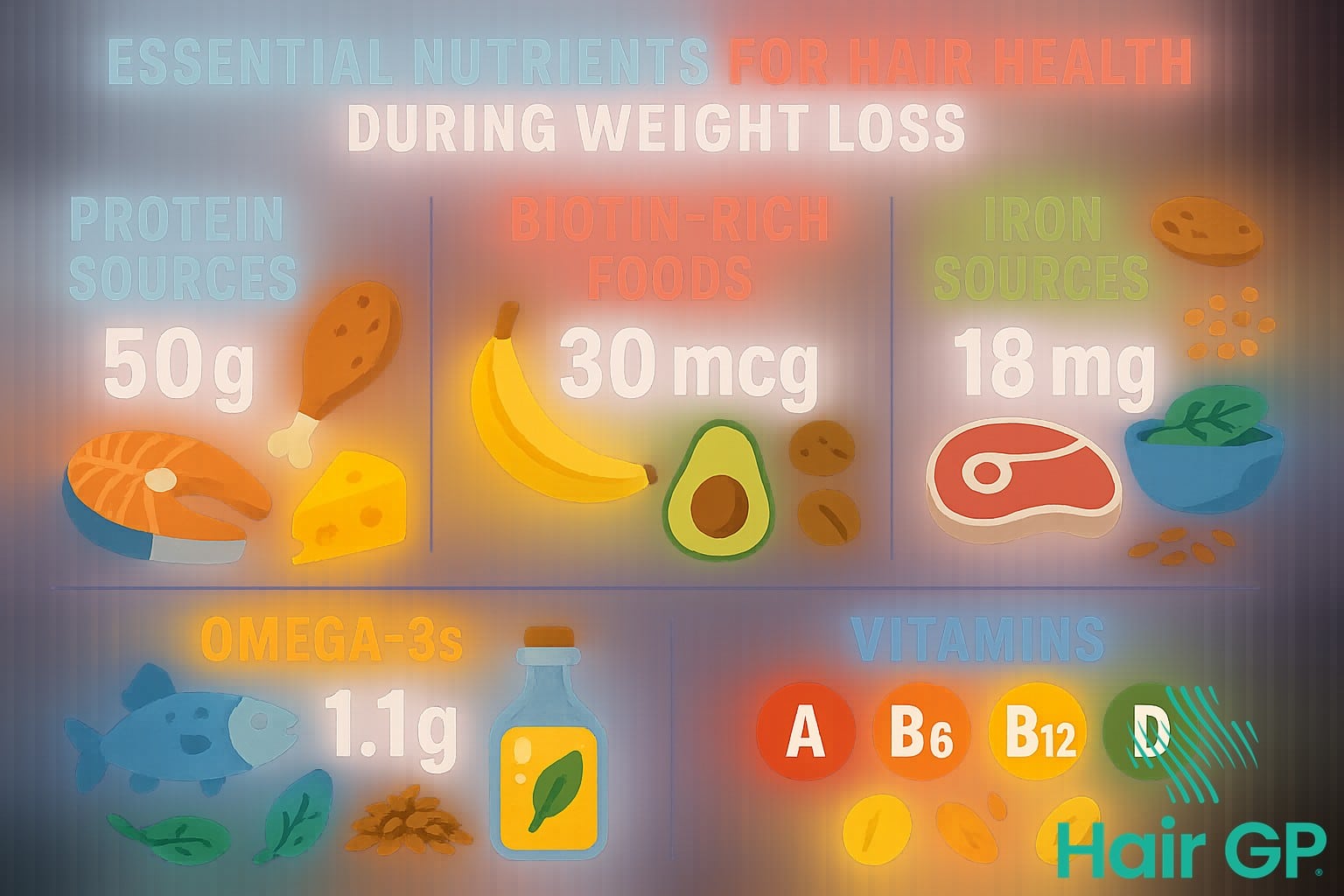
Treatment Options for Weight Loss-Related Hair Loss
For individuals experiencing hair thinning whilst on weight loss medications, several evidence-based treatments can help mitigate hair loss and restore hair density. The most clinically validated approach involves topical minoxidil, available in 2% and 5% formulations, which has demonstrated effectiveness in treating telogen effluvium by shortening the telogen phase and prolonging anagen [6]. Applied directly to the scalp twice daily, minoxidil can stimulate hair growth within three to four months of consistent use.
Nutritional supplementation plays a crucial role in supporting healthy hair recovery. Iron, zinc, and vitamin D deficiencies often accompany rapid weight loss and can exacerbate hair shedding. A comprehensive multivitamin specifically formulated for hair health, combined with adequate protein intake of at least 60-80 grams daily, provides essential building blocks for keratin production. Omega-3 fatty acids and collagen supplements may further support follicle health and hair structure.
Complementary scalp treatments enhance the effectiveness of medical interventions. Gentle scalp massage improves blood circulation to hair follicles, whilst specialised hair products containing caffeine, niacinamide, or peptides can create an optimal environment for regrowth. Low-level laser therapy devices, though requiring further research, show promise in stimulating cellular activity within follicles. Importantly, avoiding harsh chemical treatments, excessive heat styling, and tight hairstyles prevents additional mechanical stress on already vulnerable hair. Most patients see significant improvement within six months when combining these approaches with stabilised weight and improved nutrition.

Recovery Timeline and What to Expect
Understanding the recovery timeline can ease anxiety when experiencing hair loss from weight loss medications. Excessive shedding typically begins two to three months after starting treatment, coinciding with rapid weight reduction. During this phase, more hair follicles enter the resting stage simultaneously, causing noticeable thinning hair that may feel alarming but is usually temporary.
The good news is that hair stops growing temporarily rather than dying permanently. Most patients notice shedding peaks around months three to four, then gradually decreases. New hair growth typically emerges within four to six months after the initial loss, though full recovery may take up to twelve months. Small, fine hairs appearing at the hairline often signal the beginning of regrowth.
Recovery varies considerably between individuals, influenced by nutritional status, stress levels, and overall health. Whilst permanent hair loss is rare with medication-induced telogen effluvium, seeking medical advice is crucial if shedding continues beyond six months or if bald patches develop. Signs of healthy recovery include decreased daily hair fall, improved hair texture, and visible new growth around the temples and crown. Patience remains essential, as hair growth follows natural cycles that cannot be rushed.
Conclusion
Understanding the connection between rapid weight loss and hair loss is crucial for anyone embarking on a significant diet or considering weight loss medications. As we’ve explored, telogen effluvium remains the primary culprit behind diet-related hair thinning, occurring when nutritional deficiencies and metabolic stress push hair follicles into premature resting phases. Whether you’re losing hair from crash dieting or experiencing side effects from medications like Ozempic, it’s reassuring to know that this condition is typically temporary and reversible.
Whilst rapid weight loss can unmask underlying androgenetic alopecia or trigger noticeable hair loss, proper nutritional support and gradual weight reduction significantly minimise these risks. If you notice hair loss during your weight loss journey, maintaining adequate protein intake, supplementing key vitamins and minerals, and allowing your body time to adjust can help restore normal hair growth cycles. Remember, sustainable weight loss of 1-2 pounds per week not only protects your hair but ensures lasting health benefits. Should excessive hair loss persist beyond six months, consulting a healthcare professional can help rule out other conditions and provide targeted treatment strategies for optimal hair recovery.
Frequently Asked Questions
No, hair loss from Ozempic is typically temporary. Most people experience telogen effluvium, which resolves within 3-6 months once the body adjusts or treatment is modified.
Losing 50-100 hairs daily is normal, but rapid weight loss can increase this to 150-300 hairs per day. If you notice excessive shedding or visible thinning, consult a healthcare provider.
Yes, maintaining adequate protein intake (0.8-1g per pound of body weight), taking appropriate supplements, and losing weight at a moderate pace can help minimize hair loss.
References
- Asghar F, Shamim N, Farooque U, Sheikh H, Aqeel R. Telogen Effluvium: A Review of the Literature. Cureus. 2020;12(5):e8320.
- Rebora A. Telogen effluvium: a comprehensive review. Clin Cosmet Investig Dermatol. 2019;12:583-590.
- Wilding JPH, Batterham RL, Davies M, et al. Weight regain and cardiometabolic effects after withdrawal of semaglutide: The STEP 1 trial extension. Diabetes Obes Metab. 2022;24(8):1553-1564.
- Perez-Cobo I, Nieto-Benito LM, Rossi AB, et al. Hair Loss Associated With Weight Loss Medications in a Tertiary Center. JAMA Dermatol. 2023;159(9):1011-1013.
- Wilding JPH, Batterham RL, Davies M, et al. Weight regain and cardiometabolic effects after withdrawal of semaglutide: The STEP 1 trial extension. Diabetes Obes Metab. 2022;24(8):1553-1564.
- Randolph M, Tosti A. Oral minoxidil treatment for hair loss: A review of efficacy and safety. J Am Acad Dermatol. 2021;84(3):737-746.

